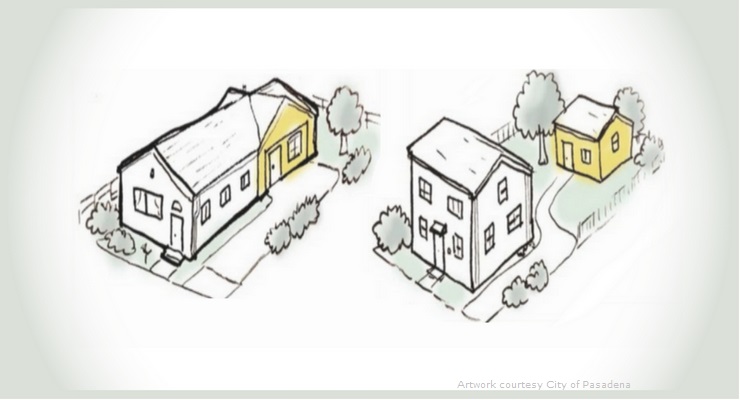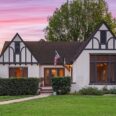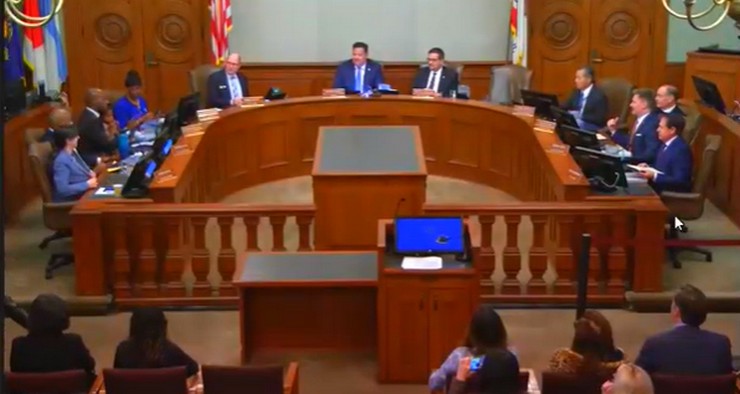
The state legislature has empowered owners of single-family lots to build accessory dwelling units (ADU) by passing laws that essentially eliminating the local prerogatives on zoning.
Most headlines have gone to AB 68, which was signed by Gov. Gavin Newsom (D) on Oct 9.
Local Assemblyman Chris Holden voted for the measure. State Sen. Anthony Portantino did not cast a vote. Neither responded to requests for comment.
Authored by Assemblymember Philip Ting (D-San Francisco), the bill facilitates the development of more ADUs and weakens barriers to their construction.
AB 68 reduces barriers to ADU approval and construction, with an eye to increasing production of low-cost, energy-efficient units and adding to California’s affordable housing supply, according to an Assembly floor analysis.
“ADUs have surged in popularity as a way to address California’s housing crisis as demand outpaces supply,” said the Assembly analysis. “AB 68 will remove remaining barriers to the widespread adoption of ADUs as low-cost, energy efficient, affordable housing that can go from policy to permit in 12 months.”
So, it’s fair to say, the state is firmly behind a policy of encouraging ADU construction. But Pasadena Councilmembers object to the state’s heavy-handedness.
“This further encroachment on our City’s ability to determine its own future must end!” said Councilman and mayoral candidate Victor Gordo in an e-mail.
Mayor Terry Tornek said he’d wait until City staff had sorted out what it all means before commenting on the specific bills.
“But one thing is clear,” said Tornek, “and that is that there’s a continued assault on local control and local government and our ability to control what happens within our cities, which is reserved power for cities.”
Councilman Gene Masuda concurred.
“I want to stress that we are for affordable housing,” he said, “but we are not for forcing it on cities and ruining our neighborhoods over it.”
Both officials did express exasperation at the legislative factory that is Sacramento.
“What’s discouraging,” said Tornek, “is that the state government continues to churn out thousands of bills and, in many cases, they’re passing bills on the heels of other bills that they’ve passed without ever giving an opportunity for us to even figure out the prior ones.”
The number of bills generated by the state government, “is too aggressive,” said Tornek.
“It’s amazing,” said Masuda, “and it’s a lot.”
While the effort to prime ADU construction may rob local officials of vital governing capacity, it is less likely to achieve its stated goals, according to Jill Shook, with Making Housing Happen.
Shook said she didn’t expect a major impact from the new laws on the fabric of Pasadena’s single-family home districts nor on the affordability of housing generally.
“The changes will have little impact because it’s very expensive to build a back house,” she asserted. “We’ve only had 40 people in Pasadena pull permits since 2017, and not all of those have started building, or finished, their units yet.”
Before that, between 2003 and 2017, only one permit was requested and granted, she added.
Shook said that, when it comes to the affordability of housing in Pasadena, the impact will be “nil.” Of those 40 permits she mentioned, but a handful were for low-income efforts.
Banks, Shook added, don’t typically approve construction loans for low-income families.
“That’s why I say the impact is nil until we can find a funding source that actually works for families to be able to do this,” she followed.
Allison Henry of the Pasadena Tenants Justice Coalition and Pasadena Tenants Union, said the new laws were more likely to increase AirBnb short-term rentals than make an actual contribution to stable housing stock for the community.
She too, said funding is the key to unleashing ADU construction. The groups she represents are “cautiously optimistic” about the state legislature’s efforts to alleviate the housing crisis through accessory structures.
Erika Foy of the Madison Heights Neighborhood Association was less sanguine about the strategy as a concept, and its impacts in practice. And, Foy said, she is not alone.
“This issue is like hotcakes,” she told Pasadena Now. “People are like, what? They are really upset, blown away.”
At issue for Foy, and those she claims to have conversed with, is neighborhood character; the loss of a slower, spacier, uncrowded landscape for one that is opposite in all three aspects.
“It totally changes the atmosphere of the neighborhood,” she said. Where a single family can now look across the yard and see another single family, the future could mean a picture with as many as four families next door.
“It’s a really strange concept,” Foy added, “if you’ve lived in a single-family home your whole life.”
Shook disagreed, said back houses are a great way to add additional units without changing the character of a neighborhood.
“I think it’s an acceptable way to increase density with what I call ‘gentle in-fill,’ by adding one or two units here and there,” she added.
According to Shook, Pasadena already has 740 illegal back houses. Making Housing Happen conducted a study of their impacts on traffic, property values, crime, and parking.
“There was absolutely no difference between the streets that had a high number of ADUs and the streets that didn’t have any,” she said.
The actual mechanics of AB 68 amend existing housing law to allow two ADUs on lots with single family homes, and multiple structures on lots with multi-family dwellings.
It prohibits local jurisdictions from minimum lot size criteria and from requiring replacement parking when parking is demolished in the creation of an ADU, so its impact reaches beyond a homeowner’s lot and into the public space of the street.
Requiring a setback for an ADU that is built within an existing structure or in the same footprint as an existing structure, and require more than a four-foot setback for all other ADUs are now, also verboten.
Three other bills addressing the granny shack phenomenon also garnered Newsom’s imprimatur.
AB 881, by Assemblyman Richard Bloom (D), restricts the ability of local governments to issue permits. It requires the streamlining of ADU approval processes when built in existing garages. It also eliminates a local jurisdiction’s prerogative to require owner-occupancy for five years before engaging in ADU construction.
SB 13, by Sen. Bob Wieckowski (D), creates a tiered fee structure intended to more equitably charge ADUs based on their size and location. It lowers the application approval time frame, creates a process whereby unpermitted ADUs can be brought up to code, and enhances an enforcement mechanism so that the state can be sure local governments are toeing the state line on ADUs.
AB 671, by Glendale Assemblywoman Laura Friedman’s (D), obligates local governments to encourage affordable ADU rentals in their housing plans. It requires the state to develop a list of state grants and financial incentives for affordable ADUs.
And the above are but a few of the detail-rich mandates handed down from the state to California’s municipalities.
“The surprising thing is that many of these legislators used to be city council members,” said Masuda. “I think they forgot what it is like to deal with local issues.”














 0 comments
0 comments



